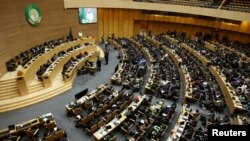African Union leaders discussed steps that need to be taken towards the domestication of the African Union’s Agenda 2063 and implementation steps for the first 10 years of the plan in member countries, according to Jacob Enoh Eben, spokesman for the Chairperson of the African Union Commission.
The leaders, who met Saturday and Sunday in Addis Ababa, also focused on mobilizing resources to facilitate the implementation of the key projects they identified. This was after Chadian President Iddris Deby was elected chairman of the African Union, taking over from Zimbabwean President Robert Mugabe.
In their initial discussion at the Peace and Security Council meeting, the leaders underscored the need to combat terrorism, as well as a commitment to continuously encourage dialogue in a bid to help resolve the political and security situations flashpoints on the continent, including Burundi and South Sudan.
Eben said the African Union was ready to provide assistance as well as monitor elections in member countries including Uganda and Ghana to ensure peace and stability during their polls.
This, Eben said formed part of the AU plan to strengthen the tenets of democracy and the rule of law. He said the leaders recognized the security challenges that terrorism poses despite efforts to combat and defeat extremism.
“Issues of terrorism remain a challenge on the continent. The heads of state also recognized that enormous efforts by the AU and by the regional economic communities but also some of the countries that are directly impacted ...,” said Eben.
“They recognized it’s important that enormous resources are mobilized to provide the necessary capacity for the institutions that have to fight against terrorism. They also looked at focusing on preventive diplomacy and looking at issues of managing diversity and also information sharing for them to be able to close their ranks and defeat and overcome these challenges.”
Critics say the African Union has not been forceful enough to ensure the conflicts in South Sudan and Burundi are resolved.
This came after the government in Bujumbura refused to accept a proposal of the Peace and Security Council to send about 5,000 peacekeepers to help protect civilians affected by the conflict in Burundi.
Critics also said the AU has been too soft on both the government of South Sudan and the rebels who have yet to fully stick to an agreement they signed to expedite the formation of a transitional unity government to restore peace, law and order.
Binta Diop, the African Union’s special envoy on Women, Peace and Security disagreed.
She said the African leaders have demonstrated commitment towards “silencing the gun” on the continent. This after the continental body announced plans to send a delegation to Burundi to help ease tension and encourage dialogue between the government and opposition groups to resolve the crisis.
The AU will also send a delegation to monitor the situation of human rights to ensure the rights of citizens are not violated.
Madam Diop also said the AU was backing Festus Mogae, former Botswana president to lead the effort to fully implement the peace agreement in South Sudan. She said women who suffered most during conflicts were also pushing the leaders to resolve the conflict.
Diop said the youths were also demanding for development and the creation of jobs for them.
“What I realized for this summit is that they are really taking the matter seriously. Iddris Deby says why do we even wait for tomorrow? We need to silence the gun today and we need to be serious about what we say and all of us take action.So I think this is very strong in terms of commitment,” said Diop.
“What is different not is that the citizens they are so much connected, the citizens are awake and they want to push these leaders of Africa to say no, we don’t want to see women violated by the one who has the gun. What we want is to make peace and they are [making] the leaders accountable. So that is the reality on the ground.”




